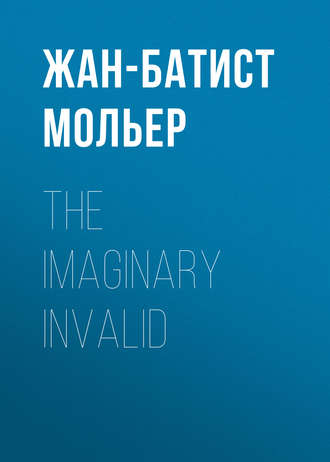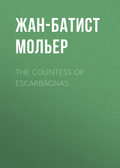
Мольер (Жан-Батист Поклен)
The Imaginary Invalid
SCENE VI. – BÉLINE, ARGAN
Arg. Ah! come near, my wife.
Bel. What ails you, my poor, dear husband?
Arg. Come to my help.
Bel. What is the matter, my little darling child?
Arg. My love.
Bel. My love.
Arg. They have just put me in a rage.
Bel. Alas! my poor little husband! How was that, my own dear pet?
Arg. That jade of yours, Toinette, has grown more insolent than ever.
Bel. Don't excite yourself.
Arg. She has put me in a rage, my dove.
Bel. Gently, my child.
Arg. She has been thwarting me for the last hour about everything I want to do.
Bel. There, there; never mind.
Arg. And has had the impudence to say that I am not ill.
Bel. She is an impertinent hussy.
Arg. You know, my soul, what the truth is?
Bel. Yes, my darling, she is wrong.
Arg. My own dear, that jade will be the death of me.
Bel. Now, don't, don't.
Arg. She is the cause of all my bile.
Bel. Don't be so angry.
Arg. And I have asked you ever so many times to send her away.
Bel. Alas! my child, there is no servant without defects. We are obliged to put up at times with their bad qualities on account of their good ones. The girl is skilful, careful, diligent, and, above all, honest; and you know that in our days we must be very careful what people we take into our house. I say, Toinette.
SCENE VII. – ARGAN, BÉLINE, TOINETTE
Toi. Madam.
Bel. How is this? Why do you put my husband in a passion?
Toi. (in a soft tone). I, Madam? Alas! I don't know what you mean, and my only aim is to please master in everything.
Arg. Ah! the deceitful girl!
Toi. He said to us that he wished to marry his daughter to the son of Mr. Diafoirus. I told him that I thought the match very advantageous for her, but that I believed he would do better to put her in a convent.
Bel. There is not much harm in that, and I think that she is right.
Arg. Ah! deary, do you believe her? She is a vile girl, and has said a hundred insolent things to me.
Bel. Well, I believe you, my dear. Come, compose yourself; and you, Toinette, listen to me. If ever you make my husband angry again, I will send you away. Come, give me his fur cloak and some pillows, that I may make him comfortable in his arm-chair. You are all anyhow. Pull your night-cap right down over your ears; there is nothing that gives people such bad colds as letting in the air through the ears.
Arg. Ah, deary! how much obliged I am to you for all the care you take of me.
Bel. (adjusting the pillows, which she puts round him). Raise yourself a little for me to put this under you. Let us put this one for you to lean upon, and this one on the other side; this one behind your back, and this other to support your head.
Toi. (clapping a pillow rudely on his head). And this other to keep you from the evening damp.
Arg. (rising angrily, and throwing the pillows after Toinette, who runs away). Ah, wretch! you want to smother me.
SCENE VIII. – ARGAN, BÉLINE
Bel. Now, now; what is it again?
Arg. (throwing himself in his chair). Ah! I can hold out no longer.
Bel. But why do you fly into such a passion? she thought she was doing right.
Arg. You don't know, darling, the wickedness of that villainous baggage. She has altogether upset me, and I shall want more than eight different mixtures and twelve injections to remedy the evil.
Bel. Come, come, my dearie, compose yourself a little.
Arg. Lovey, you are my only consolation.
Bel. Poor little pet!
Arg. To repay you for all the love you have for me, my darling, I will, as I told you, make my will.
Bel. Ah, my soul! do not let us speak of that, I beseech you. I cannot bear to think of it, and the very word "will" makes me die of grief.
Arg. I had asked you to speak to our notary about it.
Bel. There he is, close at hand; I have brought him with me.
Arg. Make him come in then, my life!
Bel. Alas! my darling, when a woman loves her husband so much, she finds it almost impossible to think of these things.
SCENE IX. – MR. DE BONNEFOI, BÉLINE, ARGAN
Arg. Come here, Mr. de Bonnefoi, come here. Take a seat, if you please. My wife tells me, Sir, that you are a very honest man, and altogether one of her friends; I have therefore asked her to speak to you about a will which I wish to make.
Bel. Alas! I cannot speak of those things.
Mr. de Bon. She has fully explained to me your intentions, Sir, and what you mean to do for her. But I have to tell you that you can give nothing to your wife by will.
Arg. But why so?
Mr. de Bon. It is against custom. If you were in a district where statute law prevailed, the thing could be done; but in Paris, and in almost all places governed by custom, it cannot be done; and the will would be held void. The only settlement that man and wife can make on each other is by mutual donation while they are alive, and even then there must be no children from either that marriage or from any previous marriage at the decease of the first who dies.
Arg. It's a very impertinent custom that a husband can leave nothing to a wife whom he loves, by whom he is tenderly loved, and who takes so much care of him. I should like to consult my own advocate to see what I can do.
Mr. de Bon. It is not to an advocate that you must apply; for they are very particular on this point and think it a great crime to bestow one's property contrary to the law. They are people to make difficulties, and are ignorant of the bylaws of conscience. There are others whom you may consult with advantage on that point, and who have expedients for gently overriding the law, and for rendering just that which is not allowed. These know how to smooth over the difficulties of an affair, and to find the means of eluding custom by some indirect advantage. Without that, what would become of us every day? We must make things easy; otherwise we should do nothing, and I wouldn't give a penny for our business.
Arg. My wife had rightly told me, Sir, that you were a very clever and honest man. What can I do, pray, to give her my fortune and deprive my children of it?
Mr. de Bon. What you can do? You can discreetly choose a friend of your wife, to whom you will give all you own in due form by your will, and that friend will give it up to her afterwards; or else you can sign a great many safe bonds in favour of various creditors who will lend their names to your wife, and in whose hands they will leave a declaration that what was done was only to serve her. You can also in your lifetime put in her hands ready money and bills which you can make payable to bearer.
Bel. Alas! you must not trouble yourself about all that. If I lose you, my child, I will stay no longer in the world.
Arg. My darling!
Bel. Yes, my pet, if I were unfortunate enough to lose you …
Arg. My dear wifey!
Bel. Life would be nothing to me.
Arg. My love!
Bel. And I would follow you to the grave, to show you all the tenderness I feel for you.
Arg. You will break my heart, deary; comfort yourself, I beseech you.
Mr. de Bon. (to BÉLINE). These tears are unseasonable; things have not come to that yet.
Bel. Ah, Sir! you don't know what it is to have a husband one loves tenderly.
Arg. All the regret I shall have, if I die, my darling, will be to have no child from you. Mr. Purgon told me he would make me have one.
Mr. de Bon. That may come still.
Arg. I must make my will, deary, according to what this gentleman advises; but, out of precaution, I will give you the twenty thousand francs in gold which I have in the wainscoting of the recess of my room, and two bills payable to bearer which are due to me, one from Mr. Damon, the other from Mr. Géronte.
Bel. No, no! I will have nothing to do with all that. Ah! How much do you say there is in the recess?
Arg. Twenty thousand francs, darling.
Bel. Don't speak to me of your money, I beseech you. Ah! How much are the two bills for?
Arg. One, my love, is for four thousand francs, and the other for six thousand.
Bel. All the wealth in the world, my soul, is nothing to me compared to you.
Mr. de Bon. (to Argan). Shall we draw up the will?
Arg. Yes, Sir. But we shall be more comfortable in my own little study. Help me, my love.
Bel. Come, my poor, dear child.
SCENE X. – ANGÉLIQUE, TOINETTE
Toi. They are shut up with the notary, and I heard something about a will; your mother-in-law doesn't go to sleep; it is, no doubt, some conspiracy of hers against your interests to which she is urging your father.
Ang. Let him dispose of his money as he likes, as long as he does not dispose of my heart in the same way. You see, Toinette, to what violence it is subjected. Do not forsake me, I beseech you, in this my extremity.
Toi. I forsake you! I had rather die. In vain does your stepmother try to take me into her confidence, and make me espouse her interests. I never could like her, and I have always been on your side. Trust me, I will do every thing to serve you. But, in order to serve you more effectually, I shall change my tactics, hide my wish to help you, and affect to enter into the feelings of your father and your stepmother.
Ang. Try, I beseech you, to let Cléante know about the marriage they have decided upon.
Toi. I have nobody to employ for that duty but the old usurer Punchinello, my lover; it will cost me a few honeyed words, which I am most willing to spend for you. To-day it is too late for that, but to-morrow morning early I will send for him, and he will be delighted to …
SCENE XI. – BÉLINE (in the house), ANGÉLIQUE, TOINETTE
Bel. Toinette.
Toi. (to Angélique). I am called away. Good night. Trust me.
ACT II
SCENE I. – CLÉANTE, TOINETTE
Toi. (not recognising Cléante). What is it you want, Sir?
Cle. What do I want?
Toi. Ah! ah! is it you? What a surprise! What are you coming here for?
Cle. To learn my destiny, to speak to the lovely Angélique, to consult the feelings of her heart, and to ask her what she means to do about this fatal marriage of which I have been told.
Toi. Very well; but no one speaks so easily as all that to Angélique; you must take precautions, and you have been told how narrowly she is watched. She never goes out, nor does she see anybody. It was through the curiosity of an old aunt that we obtained leave to go to the play where your love began, and we have taken good care not to say anything about it.
Cle. Therefore am I not here as Cléante, nor as her lover, but as the friend of her music-master, from whom I have obtained leave to say that I have come in his stead.
Toi. Here is her father; withdraw a little, and let me tell him who you are.
SCENE II. – ARGAN, TOINETTE
Arg. (thinking himself alone). Mr. Purgon told me that I was to walk twelve times to and fro in my room every morning, but I forgot to ask him whether it should be lengthways or across.
Toi. Sir, here is a gentleman …
Arg. Speak in a lower tone, you jade; you split my head open; and you forget that we should never speak so loud to sick people.
Toi. I wanted to tell you, Sir …
Arg. Speak low, I tell you.
Toi. Sir … (She moves her lips as if she were speaking.)
Arg. What?
Toi. I tell you that … (As before.)
Arg. What is it you say?
Toi. (aloud). I say that there is a gentleman here who wants to speak to you.
Arg. Let him come in.
SCENE III. – ARGAN, CLÉANTE, TOINETTE
Cle. Sir.
Toi. (to Cléante). Do not speak so loud, for fear of splitting open the head of Mr. Argan.
Cle. Sir, I am delighted to find you up, and to see you better.
Toi. (affecting to be angry). How! better? It is false; master is always ill.
Cle. I had heard that your master was better, and I think that he looks well in the face.
Toi. What do you mean by his looking well in the face? He looks very bad, and it is only impertinent folks who say that he is better; he never was so ill in his life.
Arg. She is right.
Toi. He walks, sleeps, eats, and drinks, like other folks, but that does not hinder him from being very ill.
Arg. Quite true.
Cle. I am heartily sorry for it, Sir. I am sent by your daughter's music-master; he was obliged to go into the country for a few days, and as I am his intimate friend, he has asked me to come here in his place, to go on with the lessons, for fear that, if they were discontinued, she should forget what she has already learnt.
Arg. Very well. (To Toinette) Call Angélique.
Toi. I think, Sir, It would be better to take the gentleman to her room.
Arg. No, make her come here.
Toi. He cannot give her a good lesson if they are not left alone.
Arg. Oh! yes, he can.
Toi. Sir, it will stun you; and you should have nothing to disturb you in the state of health you are in.
Arg. No, no; I like music, and I should be glad to… Ah! here she is. (To Toinette) Go and see if my wife is dressed.
SCENE IV. – ARGAN, ANGÉLIQUE, CLÉANTE
Arg. Come, my daughter, your music-master is gone into the country, and here is a person whom he sends instead, to give you your lesson.
Ang. (recognising Cléante). O heavens!
Arg. What is the matter? Why this surprise?
Ang. It is …
Arg. What can disturb you in that manner?
Ang. It is such a strange coincidence.
Arg. How so?
Ang. I dreamt last night that I was in the greatest trouble imaginable, and that some one exactly like this gentleman came to me. I asked him to help me, and presently he saved me from the great trouble I was in. My surprise was very great to meet unexpectedly, on my coming here, him of whom I had been dreaming all night.
Cle. It is no small happiness to occupy your thoughts whether sleeping or waking, and my delight would be great indeed if you were in any trouble out of which you would think me worthy of delivering you. There is nothing that I would not do for …







